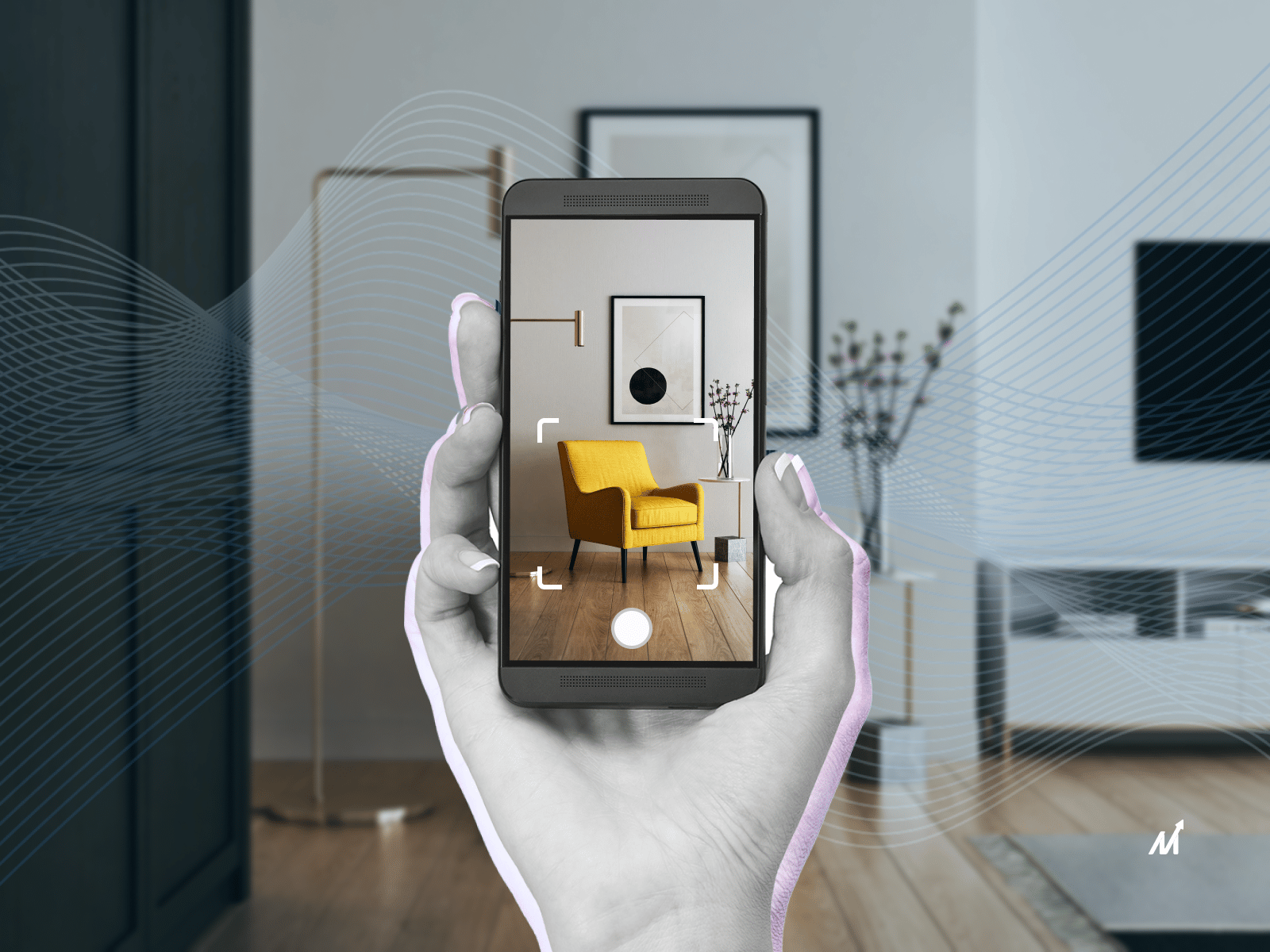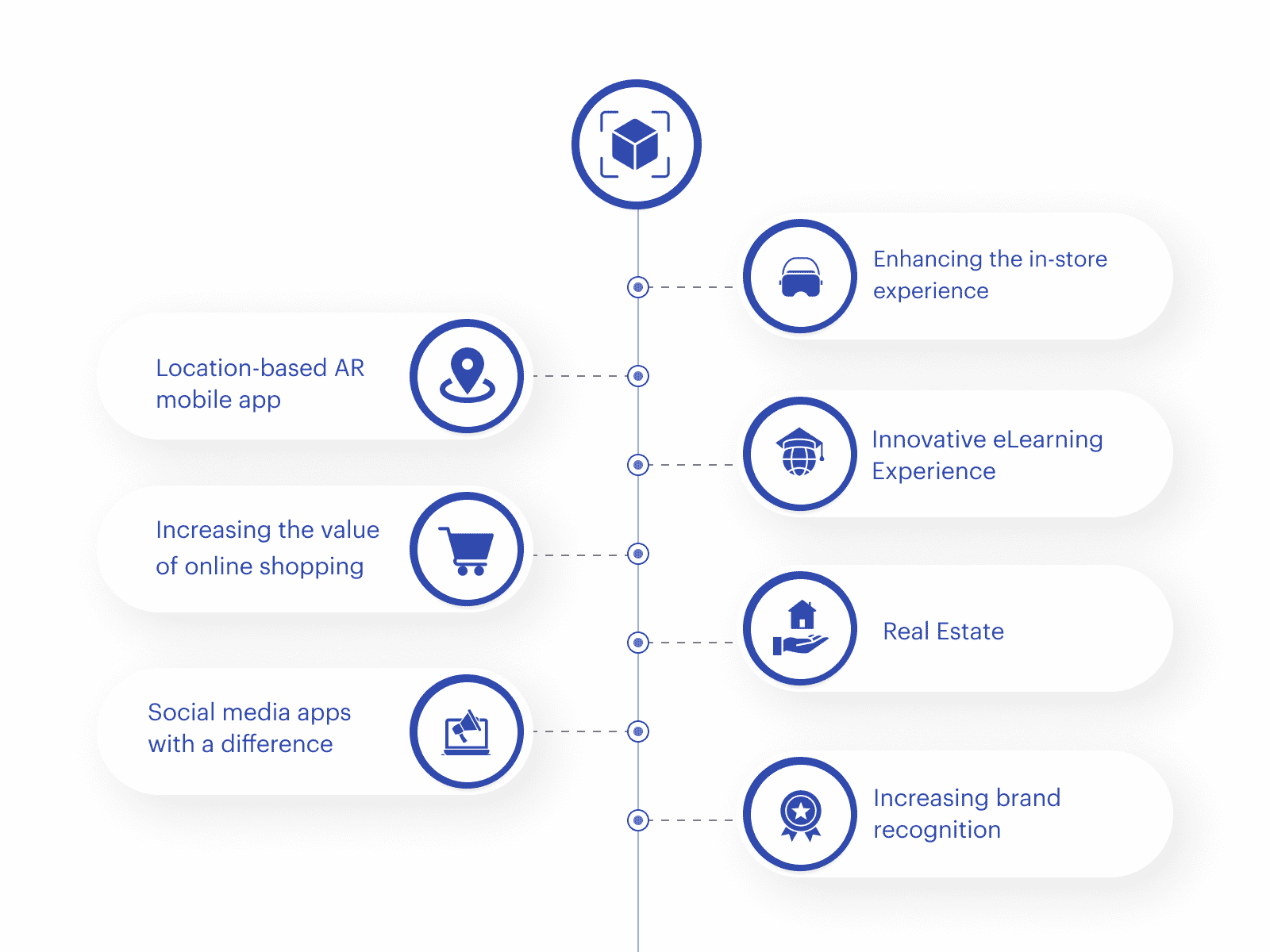AR App Development: Introduction
AR is a dazzling technology that extends the capability of mobile apps on smartphones and tablets. By leveraging AR app development, IT companies can develop apps for diverse platforms and do more with hybrid app development.
Because 83.72% of users have smartphones (According to Statista), the Android app development company expects to benefit from this technology.
In the commercial world, AR has changed everything. Allowing people to test products more creatively has narrowed the gap in product reliability, especially in eCommerce.
In this blog, we’ll discuss the role of AR in mobile app development services as well as its importance in designing futuristic app solutions.
In fact, in the year 2022 and beyond, AR has the potential to revolutionize the entire mobile app development domain.
How AR App Development Is Boosting The Scope Of Mobile Apps?
Let’s look at how Augmented Reality Mobile Apps are changing company and customer relations.
1. Enhancing The In-Store Experience
Customers can replicate actual-sized products in virtual trial rooms using AR mobile apps, offering them a virtual in-store experience.
In the retail industry, an AR mobile app can save time and as well as effort by allowing users to try on garments in virtual fitting rooms.
Augmented reality software can also allow retailers to display more inventory than they can handle. Converse, Sephora, and L’Oréal are some examples of AR apps.
2. Location-Based AR Mobile App
The geolocation data in mobile phones are used to deliver information about a specific location in a location-based AR mobile app. With an augmented overlay, a user can interact with the world physically.
With location-based AR apps, customers can get an interactive tour of a city or identify where they parked their cars in nearby places.
3. Innovative eLearning Experience
The educational industry will undoubtedly benefit from AR technology. AR apps can help online education and e-learning become more dynamic and successful.
While interacting with their students, tutors can use virtual visuals or animations in real time. This educational breakthrough has the potential to transform the learning experience altogether. For example, ZooBurst and Chromville Science are two popular AR apps.
4. Increasing The Value Of Online Shopping
Customers typically check for demo videos or footage of unboxed things before deciding to purchase the same item.
Companies and brands can use AR mobile apps to provide real-world depictions and configurations of their products. This will aid them in removing the possibility of skepticism and abandoned shopping carts.
5. Real Estate
The real estate market utilizes AR business applications to their full potential. Agents and real estate brokers are using the AR mobile app to showcase the benefits of the property.
The smartphone app uses AR to provide potential renters with a 3D view of the apartment or flat.
6. Social Media Apps With A Difference
Snapchat is one of the most popular AR apps. As users spend more time on their mobile devices and hunt for fascinating apps, mobile app developers can leverage AR technology to create a unique social networking app that will ensure user engagement and success.
7. Increasing Brand Recognition
AR technology is assisting businesses in raising brand recognition. A corporation can gain an advantage over its competition by using AR apps to attract more clients.
The AR app is a driving factor behind mobile app marketing since it helps attract new clients while retaining existing ones.
AR App Development: Role Of Mobile App
The growing popularity of augmented reality devices fuels the development of more complex mobile applications. As Android smartphones dominate the industry, several app development companies are taking advantage. According to Statista, AR has already begun to influence app development worldwide.
Various industries, such as land, money, and medical services, are asking for mobile AR app development to aid them in their internal activities.
Furthermore, because the world of gadgets is controlled by Android and iOS devices, it is apparent that the AR application will need to function in advance with cross-platform development to broaden its usage scope.
Clients passionately associate with their product before purchasing it, and businesses know this. As a result, they look for innovations and technology that will enable them to engage with their times and goods more incredibly with potential clients.
This is where entrepreneurs can find a way to differentiate themselves from their competitors. AR is thought to represent the following levels of client dedication and experience.
It could be a significant advantage in retail and eCommerce, as customers constantly look for a reasonable audit of things.
Benefits Of AR App Development
The following are some of the advantages or benefits of Augmented Reality (AR):
- It can help you save money by allowing you to test crucial circumstances before adopting them in real-time. It can be implemented in the actual world once it has been verified.
- The AR technology is interactive and works in tandem with the real-time environment.
- It can be used as part of a training program since it makes things more memorable and appealing to the eye.
- It can be utilized by anyone, depending on the application.
- Patients’ lives have been safer due to their utilization in the medical industry.
- It improves real-world perceptions and interactions.
- It blurs the border between the actual and virtual worlds.
What’s Next In AR For Business?
According to recent research VR/AR market size 2024 | Statista, augmented reality’s worldwide worth could reach $162 billion by 2024.
The popularity of augmented reality gadgets is helping to drive the rise of smartphone apps. Because Android phones have such a strong influence on the market, Android app development companies will likely acquire a competitive advantage.
Around the world, augmented reality is becoming more popular and impacting mobile application development.
Several industries, including real estate, finance, and healthcare, are asking for mobile AR app development to keep their internal operations running smoothly.
Customers prefer to interact actively with a product before purchasing, and firms and enterprises are aware of this.
AR App Development: Conclusion
In conclusion, we are confident that this futuristic technology will assist practically every industry sector in the coming years.
As a result, the rise of AR in mobile app development appears irreversible. This technology will soon become unavoidable in the development of next-generation commercial apps.
Our devoted and skilled developers at Markovate can combine current technology trends like VR (Virtual Reality), AR (Augmented Reality), and IoT (Internet of Things) in designing customized, enterprise-grade mobile app solutions.
Our mobile app development service, combined with our client-focused approach, has driven us to the top of the mobile app development company.
AR App Development: FAQs
1. What’s the difference between Augmented Reality (AR) and Virtual Reality (VR)?
Virtual Reality (VR) gives a truly immersive experience by blocking the physical world using sensory devices such as headsets. In contrast, Augmented Reality (AR) creates a seamless blend of the real and digital worlds by superimposing digital components on top of the real world.
2. What are some AR mobile apps and examples?
Augmented reality has numerous applications outside of the gaming as well as entertainment industries. AR has already demonstrated its ability to tackle various commercial problems, ranging from healthcare to education to retail to industrial manufacturing.
Some real-life AR applications include medical training, augmented online classrooms, job training, app design and prototyping, repair and maintenance, business logistics, immersive shopping, and providing tourists with an enhanced experience before traveling.
Here are a few well-known examples of AR:
- Retail – IKEA Place App
- Gaming – Pokemon Go
- Beauty – Sephora Virtual Artist
- Healthcare – AccuVein
3. Should small and medium-sized businesses use AR?
Yes, incorporating augmented reality into small and medium businesses’ activities can aid in various tasks. You can give a fantastic client experience regardless of industry, develop a brand reputation, and run operations efficiently.
4. Is Augmented Reality (AR) useful in marketing?
Yes, by incorporating Augmented Reality (AR) into your marketing and sales strategies, you can differentiate yourself from the competition, increase engagement with potential customers, provide a unique immersive experience, meet changing customer needs and expectations, raise brand awareness, and increase ROI.
5. Is AR mean Metaverse? What’s the difference or relation?
The Metaverse is a simulated digital environment that combines augmented reality (AR), virtual reality (VR), blockchain, and social media principles to create areas for rich user interaction that mirror the actual world.
In the Metaverse, technologies such as virtual reality (VR) and augmented reality (AR) are merged to create the sensation of virtual presence.

I’m Rajeev Sharma, Co-Founder and CEO of Markovate, an innovative digital product development firm with a focus on AI and Machine Learning. With over a decade in the field, I’ve led key projects for major players like AT&T and IBM, specializing in mobile app development, UX design, and end-to-end product creation. Armed with a Bachelor’s Degree in Computer Science and Scrum Alliance certifications, I continue to drive technological excellence in today’s fast-paced digital landscape.









